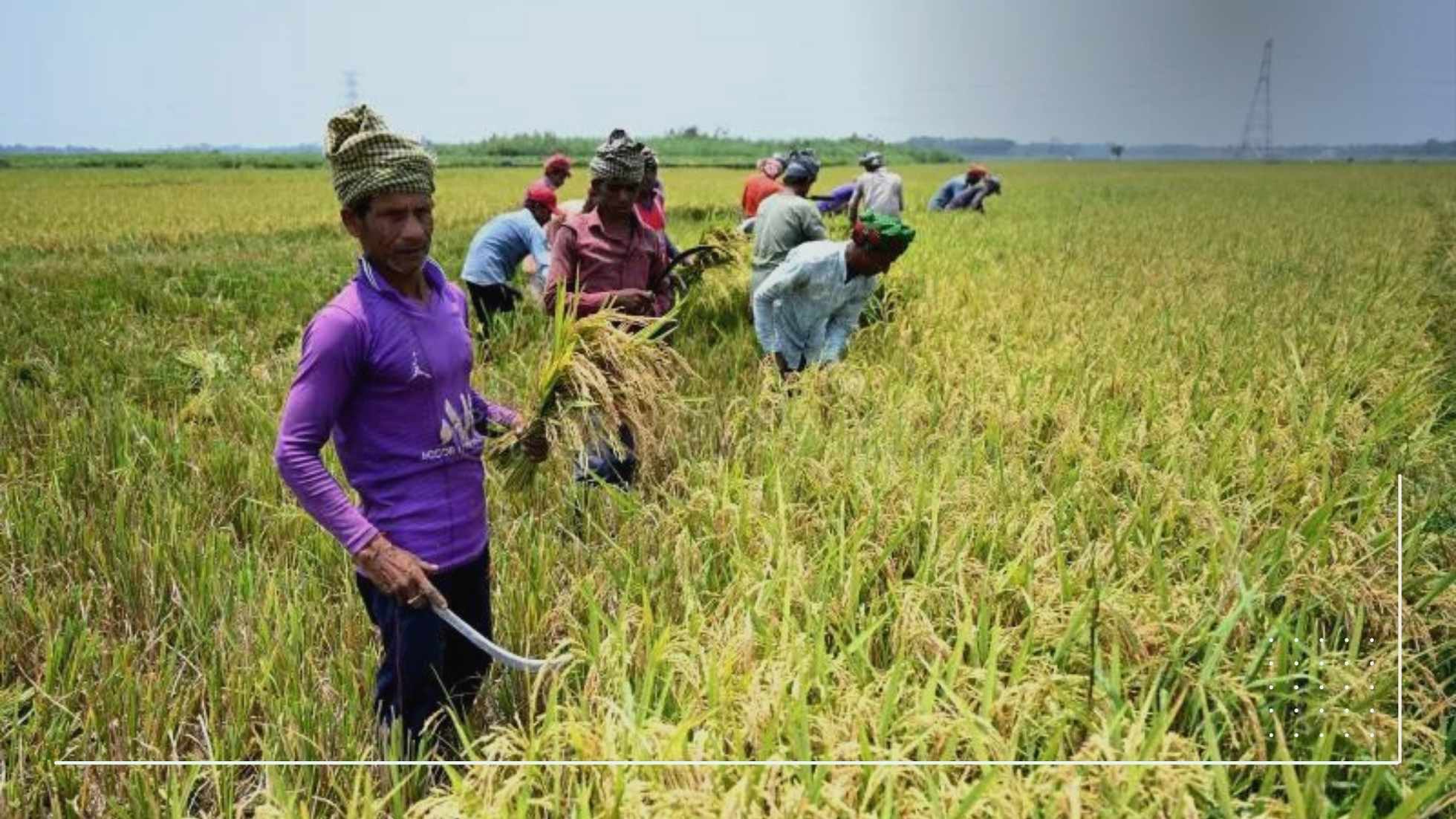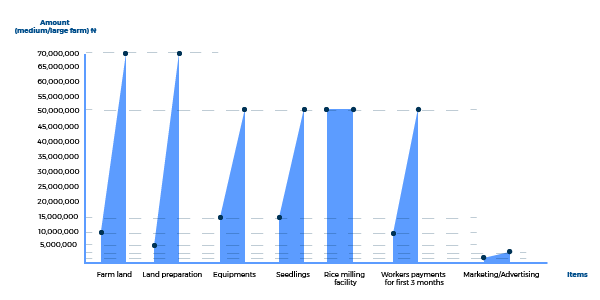6 Steps to Start a Rice Farming Business in Nigeria

by Counseal Team
Updated February 15, 2024

Annually, an average of 5. 5 million metric tonnes of rice is consumed in Nigeria. Between 2021 and 2022 this increased to almost 7 million metric tonnes, and it’s expected to keep increasing.
The Big Opportunity for you
According to reports from USDA and the Thai Rice Exporters Association (TREA), Nigeria has produced between 4.4 million metric tonnes to 5 million metric tonnes of rice between 2018 and 2022. This leaves a deficit of 2 million metric tonnes of rice.. According to projections by MSMEs today, the rice consumption deficit will increase by 4% by 2029.
This creates good business opportunities for you, a local rice producer.
Quick Takes
How much does it cost to start this business?
The cost of setting up a rice farm could be as low as N2,000,000 ($1,333) for a hectare of land to as much as 225 million Naira (or 150,000 US Dollars) to successfully set up a rice farm in Nigeria.
This cost includes the expenses of land, equipment, seeds, fertilisers, pesticides, irrigation, and labour.
However, the cost may vary depending on the location, size, and type of your rice farm.
Rice farming is a lucrative and profitable agribusiness opportunity in Nigeria, as rice is one of the most consumed foods in the country. With proper planning, market analysis, and management, you can start and grow your own rice farming enterprise.
How much can you make per month?
The amount of money you can make per month from rice farming in Nigeria depends on various factors, such as the size of your farm, the type of rice you grow, the quality of your inputs, the market price, and the production costs.
The average rice yield per hectare in Nigeria is 2.5 to 4 tons. Assuming you sell a bag of rice for N12,000 (or 8 US Dollars), and you have a farm of 10 hectares, you can make between N300,000 (or 200 US Dollars) to N480,000 (or 320 US Dollars) per hectare per month. Therefore, your total monthly income from rice farming would be between N3,000,000 (or 2,000 US Dollars) to N4,800,000 (or 3,200 US Dollars).
However, this is just an estimate and it does not account for the production costs, such as land, equipment, seeds, fertilisers, pesticides, irrigation, and labour. You will also need to deduct taxes, transportation, storage, and marketing expenses from your income. To get a more accurate figure, you will need to do a detailed rice farming business plan that considers your specific situation and goals.
What is the minimum required to start this business?
The minimum cost of starting a rice farming business in Nigeria depends on the scale and type of your farm, as well as the location, equipment, seeds, fertilisers, pesticides, irrigation, and labour costs.
You will need an estimatedN2,000,000 (or 1,333 US Dollars) to successfully set up a rice farm in Nigeria on a small scale, on about one hectare of land.
However, these are just estimates and they may vary depending on the market conditions and your specific situation. Therefore, it is advisable to do a detailed rice farming business plan that considers your goals, budget, and resources.
What are the best states to start this business?
The best states to start a rice farming business in Nigeria are those that have favourable climatic and soil conditions, adequate water supply, good infrastructure, and access to markets. Based on the web search results some of the best states for rice farming in Nigeria are:
- Kebbi State: The largest rice producing state in Nigeria, with an annual production of over 2 million metric tons. Kebbi State has a suitable climate, fertile land, and abundant water resources for rice cultivation.
- Ebonyi State: The second-largest rice producing state in Nigeria, with an annual production of over 1.5 million metric tons. Ebonyi State has a rich soil, favourable rainfall, and a large market for rice products.
- Benue State: The third-largest rice producing state in Nigeria, with an annual production of over 1.2 million metric tons. Benue State has a tropical climate, a large river basin, and a well-developed rice value chain.
- Kano State: The fourth-largest rice producing state in Nigeria, with an annual production of over 1 million metric tons. Kano State has a semi-arid climate, a large irrigation scheme, and a high demand for rice.
These are some of the best states for rice farming in Nigeria that you can consider for your business. However, you should also do your own research and feasibility study before making a final decision.
What are the known examples of this business?
Some of the known examples of rice farming businesses in Nigeria are:
- Coscharis Group: A large-scale rice producer that can produce 8 metric tonnes per hectare with its hybrid variety.
- Olam: A global agribusiness company that operates a 10,000-hectare rice farm and a 36,000-metric-tonne rice mill in Nigeria.
- Quarra: A Nigerian company that produces and processes rice, maize, and other crops on over 20,000 hectares of land.
- Dangote: A multinational conglomerate that has invested in rice production and milling in Nigeria, aiming to produce 1 million metric tonnes of rice annually.
These are some of the successful rice farming businesses in Nigeria that you can learn from and emulate.
Let’s see the steps you need to take to make good cash from the Rice farming business in Nigeria.
Step 1: Research and train yourself
To start, here are the key items you need to know:
Seed:
In Nigeria, rice seeds are categorized according to where they are planted, i.e., lowland and upland. The seeds planted on the lowland are Faro 44, Faro 52, and Faro 57. For upland the seed varieties are, Nerica 1, Nerica 2, Nerica 4, Nerica 7, Nerica 8.
You can get these seeds from research institutes such as IITA, seed companies, designated government ministries and accredited Agro dealers.
Soil/land type:
Rice planting requires specific types of soil, which are clay, clay-loam or loamy soil. This is because rice loves lots of water, so water holding soil is ideal.
Weed control:
Weed controls are applied before and after planting. Research the best herbicides to use for both stages. For instance, most farmers use glyphosate herbicide at the pre-plant stage and quintrione after planting and transplanting.
Fertilizer:
You need to learn different fertilizers for rice at different stages. This means that rice needs different nutrients for different stages, hence you need a pedologist. They will advise you on what you need at what stage and what quantity to apply.
Pest control:
There are different ways to control pests. Some of them are integrated pest management (IPM), crop rotation, etc. This is an important aspect of your research that you need to understand so your investment doesn’t go to waste.
Milling/Processing
To make more money from rice farming, you will need to get involved in rice milling and processing. This involves pre-cleaning, de-husking, de-stoning, polishing, whitening, sifting, grading and packaging your harvested rice.Yes, you will have employed professionals to handle this, but when handling people, you need to know a little of everything, hence a little training in rice milling or processing.
Machineries/tools:
As much as rice farming/production is labour intensive, there are tools you also cannot do without. So, you need to research them and know what to use them for and how to use them. Some of these tools and machineries for planting and processing are:
- Disc plough
- Mould board plough
- Disc harrow
- Rotavator
- Comb harrow
- Puddler
- Power tiller
- Rice transplanter
- Sickle
- Paddy Separator
- Paddy Cleaner
- Rice Huller
- Rice Whitener
- Rice Grader
- Paddy Dehusker
- Rice Destoner
- Rice Cleaning Machine
- Rice Length Grader
- Rice Mill Dryer
- Rice Pulverize
- Mini Rice Mill
- Rice Polisher
- Rice Flour Mill
- Paddy Dryer Plant
- Paddy Parboiling Plant
- Pneumatic Rubber Sheller
- Husk Aspirator
- Rice Plan sifter
- Thickness Grader
- Rice Dehusking Machine
- Rice Bran Centrifugal Separator
- Manual tiller
Step 2: Choose your business base
Location:
There are currently 9 states in Nigeria where rice farming thrives. These 9 states are Kano, Gombe, Niger, Kebbi, Ebonyi, Anambra, Nassarawa, Ogun, and Ekiti. Choose one of these states.
Milling and bagging of rice in one of these states makes it easier to attract other farmers who do not have rice mills, which translates into better profits.
Transportation:
An important factor when choosing your business base is accessibility.
Your location must be motorable. If transportation isn’t easy, it will discourage most customers from patronizing you. It will also cost you more money as your transports will be at risk of constant damage. Hence, your location must be motorable.
Step 3: Design a plan and register your business
Register your brand
The first stage of your registration should be with the Corporate Affairs Commission (CAC). You can book a session with our experts to help with your CAC registration after reading this article.
You are also required to register with the Federal Ministry of Agriculture and rural development as a farmer. This will open you up to any benefits from the Federal government for farmers. Benefits such as grants, loans, free seeds, etc
Other organizations you need to register with are the National Agency for Food and Drug Administration and control (NAFDAC), the Rice Farmers Association of Nigeria (RIFAN), National Rice Millers Association of Nigeria (NRMAN) and other associations that might be beneficial to your business.
Your Business plan is a guide
A business plan will help you in ways you might never imagine. The business plan is what an investor, grant organization or a loan institution will ask for before giving you money. It is very vital that it could determine how good your business might turn out. So, it is imperative that you prepare a professional business plan.
If you need help with your business plan, one of our experts who will help you design a standard business plan.
Step 4: Funding
There are different channels through which you can fund your rice farming business in Nigeria. Some of these are personal funding, Loans, Grants, crowdfunding, investments. However, whichever channel you choose, you need an understanding of what you need the funds for.
See the table below:

Table 1: Please note that the costs in table 1 are subject to changes. Our experts will help you with the current prices when preparing your business plan.
Step 5: Planting and harvesting plan
You have now come to the stage, where the actual work is done. In this stage you are required to plan your pre-plant, planting and post planting stages, as well as harvesting, depending on where your base is.
In the Northern part of Nigeria, rice is planted between mid-May to mid-June while it is planted between March to mid-April in the south. Hence, your planning should align.
Rice can be harvested between 3 to 4 months after planting once the plant changes from green to brown.
You need a crop expert on your team to handle the planting and harvesting planning and execution.
Step 6: Marketing and sale of your harvest
You only need to sell your harvested rice to milling companies if you have focused on rice farming alone. Though it sounds simple, this also requires some aggressive marketing because you have other farmers to compete with.
If you decide to go bigger by having a rice milling arm to your business, you need a full team to handle this. You need a marketing team that includes graphic designers, brand manager, social media handlers, business development personnel, etc.
In fact, you need a massive brand awareness, as you are not coming into a new market. According to The Guardian, as of January 2022, there are over 68 rice mills in Nigeria. So, you have all the almost 100 rice mills to compete with. You therefore need to focus on convincing your potential customers that you have a better rice mill through pricing, branding, attractive packaging, promotions, bonanzas, customer focused visual and audio outreaches, etc.
Conclusion
Though labour and capital intensive, rice farming in Nigeria is profitable. With the increase in the daily demand and the high export potential , it is a business that can yield a significant investment return. Book an expert consulting session on Counseal to discuss how we can help you start your rice farm.
Frequently Asked Questions
What is rice and why is it important?
Rice is a cereal grain that belongs to the grass family. It is the staple food for more than half of the world’s population, especially in Asia and Africa. Rice is rich in carbohydrates, protein, vitamins, and minerals. It also provides income and employment for millions of farmers and traders. Rice is important for food security, poverty reduction, and economic development.
What are the benefits of rice farming in Nigeria?
Rice farming in Nigeria has many benefits, such as:
- It meets the high demand for rice in the country, which is one of the most consumed food items.
- It reduces the dependence on rice imports, which saves foreign exchange and boosts local production.
- It creates jobs and income for rural and urban populations, especially women and youth.
- It contributes to the national food security and self-sufficiency goals.
- It supports the diversification of the agricultural sector and the economy.
What are the challenges of rice farming in Nigeria?
Rice farming in Nigeria also faces some challenges, such as:
- Low productivity and quality due to poor seeds, inputs, practices, and infrastructure.
- High production and marketing costs due to inadequate access to credit, extension, storage, processing, and transportation facilities.
- Inadequate policies and regulations that affect the competitiveness and profitability of rice farmers and processors.
- Environmental and social impacts of rice farming, such as water scarcity, soil erosion, pest and disease outbreaks, greenhouse gas emissions, and land conflicts.
What are the steps to start a rice farming business in Nigeria?
The steps to start a rice farming business in Nigeria are:
- Step 1: Do a feasibility study and a business plan. This will help you assess the market potential, the production requirements, the financial projections, and the risks and opportunities of your rice farming business.
- Step 2: Acquire land and prepare it for rice cultivation. You will need to find a suitable location, size, and type of land for your rice farm. You will also need to clear, plough, harrow, and level the land before planting.
- Step 3: Choose the right variety and quality of rice seeds. You will need to select the best rice variety for your agro-ecological zone, soil type, and market preference. You will also need to buy certified and disease-free seeds from reputable sources.
- Step 4: Plant and manage your rice crop. You will need to follow the best agronomic practices for rice farming, such as proper spacing, fertilisation, irrigation, weeding, pest and disease control, and harvesting.
- Step 5: Process and store your rice. You will need to thresh, dry, mill, polish, grade, and package your rice according to the quality standards and consumer preferences. You will also need to store your rice in a clean, dry, and secure place to prevent losses and spoilage.
- Step 6: Market and sell your rice. You will need to identify and reach your target customers, such as wholesalers, retailers, consumers, or exporters. You will also need to set a competitive price, promote your brand, and deliver your product.
What are the best rice varieties for Nigeria?
The best rice varieties for Nigeria are those that are adapted to the local climatic and soil conditions, resistant to pests and diseases, high-yielding, and acceptable to the consumers. Some of the popular rice varieties for Nigeria are:
- FARO: A series of improved rice varieties developed by the National Cereals Research Institute (NCRI) in collaboration with the International Rice Research Institute (IRRI). They are suitable for both rainfed and irrigated rice systems, and have high yield potential, good grain quality, and resistance to major pests and diseases.
- NERICA: A series of hybrid rice varieties developed by the Africa Rice Center (AfricaRice) in collaboration with the Japan International Research Center for Agricultural Sciences (JIRCAS). They are a cross between the African and Asian rice species, and have high yield potential, good grain quality, and tolerance to drought, iron toxicity, and African rice gall midge.
- OFADA: A traditional rice variety grown in the southwestern part of Nigeria, especially in Ogun State. It is known for its aromatic flavour, nutritional value, and cultural significance. It is usually grown under rainfed conditions, and has a low yield potential, poor grain quality, and susceptibility to pests and diseases.
How can I improve the productivity and profitability of my rice farm?
You can improve the productivity and profitability of your rice farm by:
- Adopting improved rice varieties and quality seeds that suit your agro-ecological zone, soil type, and market preference.
- Applying the right amount and type of fertilisers, organic manures, and bio-fertilizers to enhance soil fertility and crop nutrition.
- Using efficient and sustainable irrigation methods, such as drip, sprinkler, or alternate wetting and drying (AWD), to optimise water use and reduce water stress.
- Implementing integrated pest and disease management (IPM) strategies, such as crop rotation, intercropping, biological control, and judicious use of pesticides, to minimise crop losses and environmental impacts.
- Adopting mechanisation and labour-saving technologies, such as power tillers, transplanters, harvesters, threshers, dryers, and mills, to reduce drudgery and improve efficiency and quality.
- Adding value to your rice by processing, branding, and packaging it according to the quality standards and consumer preferences.
- Accessing reliable and affordable sources of credit, extension, storage, processing, and transportation facilities to reduce production and marketing costs and increase income.
- Joining or forming cooperatives, associations, or clusters of rice farmers and processors to enhance collective bargaining power, access to inputs and services, and market linkages.
What are the environmental and social impacts of rice farming and how can I mitigate them?
Rice farming has both positive and negative impacts on the environment and society, such as:
- Positive impacts: Rice farming provides food, income, and employment for millions of people, especially in rural areas. Rice farming also supports biodiversity, ecosystem services, and cultural heritage.
- Negative impacts: Rice farming consumes a large amount of water, land, and energy, and contributes to water scarcity, soil erosion, and greenhouse gas emissions. Rice farming also exposes farmers and consumers to health risks from pests, diseases, and pesticides. Rice farming also causes social conflicts over land, water, and labour rights.
You can mitigate the negative impacts of rice farming by:
- Adopting climate-smart and eco-friendly rice farming practices, such as improved varieties, fertilisers, irrigation, pest and disease management, and mechanisation, that reduce water, land, and energy use, and greenhouse gas emissions.
- Adopting organic and fair trade rice farming practices, such as organic manures, bio-fertilizers, bio-pesticides, and biocontrol agents, that enhance soil health, crop nutrition, and product quality, and protect human health and animal welfare.
- Adopting social and ethical rice farming practices, such as respecting land, water, and labour rights, ensuring gender equity and social inclusion, and promoting local knowledge and culture.





